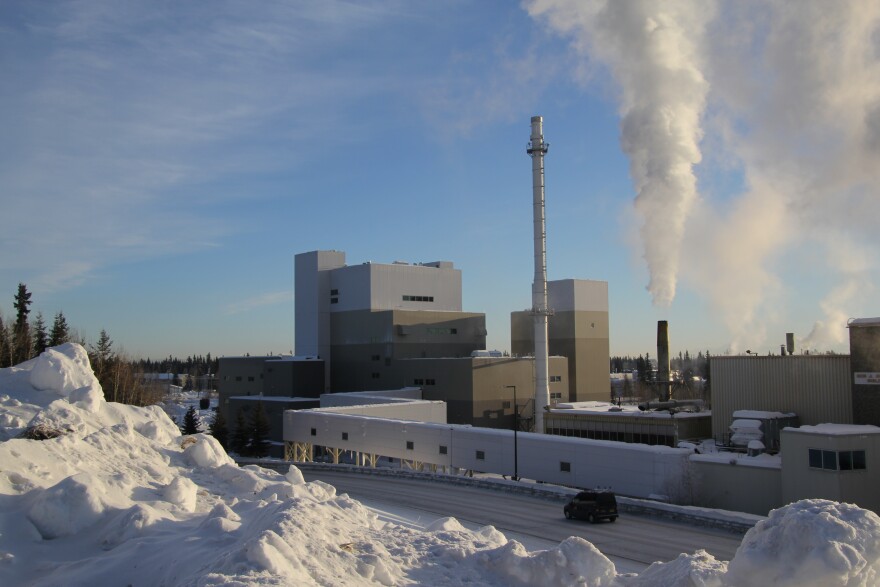The University of Alaska Fairbanks is set to receive a $9 million grant from the Biden administration to research a project that would aim to capture carbon emission from a proposed coal power plant in the Susitna Valley in Southcentral.
Northern Journal reporter Nat Herz says the idea is that the project would help reduce carbon emissions and help combat global warming.
Herz says the idea of carbon capture storage, or CCS, is drawing attention at the state level, though critics say it’s expensive, and may not have a large impact on emissions.
Listen:
This interview has been lightly edited for length and clarity.
Nat Herz: The idea is actually pretty straight forward. For a normal power plant, you're burning something, usually natural gas or historically coal. Burning that fossil fuel, you get a bunch of carbon dioxide emissions, and that just goes straight up into the sky. And that is what sits in the atmosphere at like 400+ parts per million, and is warming the climate.
So the idea with carbon capture and storage is instead of sending that carbon dioxide up into the atmosphere, you bottle it up, essentially at the source at the power plant, and then hopefully, you're close by to some kind of underground formation. And you pump that carbon dioxide underground and put it there permanently. The EPA or some other agency has to actually certify that your plan to keep it there permanently is legit. They're actually talking about running a pipeline, as much as 60 or so miles, to pipe the CO2 all the way to the Beluga River unit, which is an aging gas field on the shore of Cook Inlet, where they think that they have a lot of potential to store this carbon dioxide gas.
Wesley Early: Governor Dunleavy has also proposed a form of carbon credits recently. Is his plan related to this grant?
NH: So the governor, I would say, is all-in on carbon management, which is sort of a big picture description of ways to basically make money off of storing or otherwise not sending carbon up into the atmosphere. Last year, he proposed a whole package of legislation that actually tackles this from two different angles.
One of the bills is to set up a system to allow the state to get into this business of carbon capture and underground storage. And basically what that bill would do is allow companies to use the state's geologic formations to deposit carbon dioxide, and companies would actually pay the state maybe $2.50 or more for the privilege of storing their carbon dioxide in the ground in Alaska. The legislation that would set up the scheme for the state to deposit carbon underground, that bill is still pending in the legislature now.
WE: You note that this carbon capture storage process would be pretty expensive. How feasible is it that a proposal like this could actually get done in Alaska?
NH: I think in the United States, there is literally one operating power plant that is using this technology at commercial scale. And for the past three years, up until September, it was not working because essentially, it was too expensive to operate the technology to do the carbon capture and storage compared to how much money the company that operated it was making. And so I think there remain really significant and large questions about whether this really is cost effective.
The flip side of that is the federal government is investing a huge amount of money in subsidizing the industry. They really increase the size of a tax credit you can get for every ton of carbon stored underground. It's now at $85 a ton. In this case, the federal government is investing $9 million to basically do sort of a feasibility study of whether this coal plant in the Susitna River Valley would work as a possible viable commercial project for this technology. And in total, it's something like $8 billion that was put into the federal infrastructure law for this technology. So you know, there's a lot of tailwinds that are going into making this industry potentially get off the ground.
WE: So the Biden administration frames this as a way to address climate change. I'm curious what advocates are saying about this process of carbon capture storage?
NH: You hear a lot from climate activists that carbon capture and storage is a pseudoscience, that it's not a real, commercial, viable technology, that it's a distraction. I think there is legitimate scientific and certainly political debate about the value of this technology in the overall mix of things that we need to do to avert climate change. I think certainly, this technology is not making a huge dent in carbon emissions. Activists will say the investment into the technology for the return that we get is not worth it when we know that many other things work such as, you know, converting our power generation to wind and solar, reducing our consumption, switching to electric vehicles, things like that.
I think there's certainly intense debate about it. There's not there's certainly not a political consensus, nor honestly, I think, is there really a scientific consensus. I think what we know is that this costs a lot of money and that right now, it's requiring a lot of government investment for it to be even close to commercially viable.


